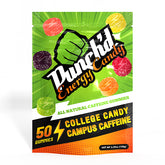6 Ways to Get Your Caffeine Fix on a Keto Diet
Of all the diets followed today, the ketogenic plan is one of the most popular. Keto diets use a low-carb, high-fat regimen. In fact, the keto diet is named after ketosis, a metabolic state in which fat, not carbohydrates, fuel the body.
By dramatically reducing the body’s intake of carbohydrates and increasing healthy fat intake, keto followers can induce ketosis to burn more fat and achieve their weight management goals.
Despite the energy boost often associated with a low-carb diet, many keto followers still long for their normal caffeine fix. To make sure you’re getting this boost from a healthy source, here are five ways to incorporate natural caffeine on a keto diet.
Update/Disclaimer: It finally happened. All the "Sugar Free" rhetoric is finally getting it's ass kicked. Most Brands and MFG's shove a bunch of artificial sweeteners in their products and label them Keto. That's cheating, especially when these ingredients like the overused Erythritol cause problems. Even CNN is reporting on this, that's when you know it's bad. Here's just one of the links: “This certainly sounds an alarm” said Dr. Andrew Freeman.
Supercharge Your Coffee
Plain black coffee is acceptable on a ketogenic diet. But if you’re like most people, your morning coffee isn’t complete without at least a dash of sugar and splash of milk.
However, cow’s milk isn’t always the best option when adhering to a low-carb diet says chiropractor Anthony Gustin, founder of PerfectKeto. When you’re starting a keto diet, he says it’s a good time to eliminate dairy for at least 30 days in order to begin with a clean slate. If you add dairy back into your diet, raw and grass-fed options are the best way to get high-quality nutrients that fuel the body.
This doesn’t mean you have to give up on adding milk to your coffee all together. In fact, there are lots of ways to get the same creamy coffee effect without the added carbs.
Hana Hamzic at Kiss My Keto agrees. “There are two reasons why you don't see milk on keto food lists: it's high in sugar and it often causes digestive problems,” she explains. Her replacement? “Unsweetened almond milk is the best keto milk you can get. One cup of almond milk has only 1 gram of net carbs and 3 grams of fat.”
Coconut milk and hemp milk can also be used in place of dairy. Another idea is to supercharge your coffee with butter or MCT oil to make a drink modeled after a brand named Bulletproof Coffee. Low carb and keto blogger Jennifer Banz shares her recipe for making this keto-friendly drink. Options for enhancing the flavor of your coffee include cinnamon, vanilla and collagen peptides.
Banz also uses stevia instead of sugar in this coffee recipe. Other sweeteners you can use are erythritol, monk fruit sweetener, xylitol, natvia, swerve and yacon syrup, says Matt at My Keto Kitchen.

Sip on Yerba Mate
If you want to wean yourself off coffee (or you’re just not a fan), there are many other options for a natural caffeine fix in the morning. Enter yerba mate. The western health-conscious individual considers it a go-to caffeine source — for more reasons than one.
Native to South America, the drink made from the leaves of the mate tree has gained popularity in the U.S. in recent years. It’s now a popular ingredient in everything from energy drinks to health elixirs, explains Priya Krishna at Food and Wine. It has been hailed not only as an energy booster, but also as a health aide that can alleviate aches and ailments of all kinds.
“Consumption of yerba mate provides antioxidant benefits to the body. It has many phytochemicals such as polyphenols, chlorogenic acid, and caffeoyl derivatives that make it a beneficial antioxidant,” writes Organic Facts’ Meenakshi Nagdeve.
Mate may also reduce stress on the liver and heart and is more effective than green tea at preventing factors that lead to heart disorders.
“Yerba mate not only protects against cellular damage but also protects the heart. This tea benefits the entire cardiovascular system. It works in part by dilating the blood vessels for better circulation,” says Katie Wells of the Wellness Mama blog.
While yerba mate can be purchased in tea bag form, it’s best to use fresh, organic tea leaves. Steeping the tea in a French Press or strainer with hot, but not boiling, water is the best way to prepare this drink, Wells adds.
Pop some Punch'd
Punch'd Energy's caffeinated gummies were developed to provide a quick energy boost. When it comes to the keto diet, Punch'd can fit in as a low-carb, ultra-low glycemic power snack or pre-workout option.
Being small and all natural gives Punch'd a leg up on most other energy products in the Keto category. Just a few gummies can get the job done, allowing for the exact count of cals and carbs for individual's diets. Each gummy contains only ~1 carb. But it's a fat burning carb because of the caffeine.
While Punch'd Energy fits into a keto diet with the green coffee bean caffeine, it's still important to consider the overall nutritional value of the energy snack. Punch'd Energy is not a substitute for nutrient-dense, whole foods like vegetables, nuts, and seeds, which should make up the majority of a keto diet. What it does well is pick you up off the ground when your energy levels drop.
Interestingly, caffeine can also affect blood sugar and insulin levels, impacting ketosis. Moderation is key, and if ketosis is done correctly there is room for a little leeway in the numbers.
There is also a concept called "Dirty Keto". You still stay all natural, but allow for a <50g carb day. You should still remain in ketosis at those levels if your blood sugars stay level. As with everything on this list, it's best to consume in moderation and monitor how it affects your energy levels and ketosis numbers.
Opt for Kombucha
Kombucha — a bubbly, probiotic health drink with ancient origins — is another natural caffeine alternative that caters to keto diets.
“Kombucha, which has been around for over 2,000 years, is a fermented drink made from bacteria and yeast mixed with black or green tea and sugar. The sugary tea turns into kombucha with the help of a SCOBY—a.k.a. "a symbiotic colony of bacteria and yeast"—which looks a bit like a floating mushroom,” explains health writer Macaela Mackenzie.
Comprised of live bacteria, kombucha offers many health benefits in the areas of digestion and longevity. And since it’s also made from tea containing caffeine, kombucha provides a small but healthy boost, says Aliza Abarbanel at Bon Appetit.
“While the fermentation process does cut down on the tea’s natural caffeine content, about ⅓ of the caffeine remains,” she writes. An entire bottle of kombucha contains less than a quarter of the caffeine found in a standard cup of coffee. This makes is a great option for people who are sensitive to caffeine, or who want to reduce their intake.
One important factor to note is that kombucha is made with sugar. Some brands have more sugar than others, so check the label before purchasing to ensure a keto-friendly brew, says the team at kombucha retailer Brew Your Bucha.

Guarana Berry
The guarana berry is native to the central Amazon basin, growing in Brazil, Venezuela, Colombia, Ecuador, Peru and the Republic of Guyana. This caffeine-rich fruit is well known for its medicinal properties, says biotechnologist Swathi Handoo.
The berry has been used in traditional medicine for hundreds of years and is also associated with tribal and cultural traditions. It is most often used to create medicinal drinks, which are said to help with a range of ailments from depression to poor memory.
SelfHacked founder and original biohacker Joe Cohen says that guarana is classified as a stimulant. Its high caffeine content helps people burn more calories throughout the day. “Overall, it increases fat (lipid) metabolism, enhances weight loss, and increases the amount of energy used for basic metabolic function, such as breathing and digestion,” he writes.
This makes it an especially helpful addition to a ketogenic diet. To incorporate more guarana into your daily meals, consider taking it as a supplement. If you do go this route, stick to 50–75 milligrams per day, says registered dietitian Rachael Link. This helps maximize the potential health benefits while preventing adverse reactions, like caffeine overconsumption.
Whip up Matcha Tea
Similar to yerba mate, matcha is a type of tea touted for its caffeine levels and health benefits. Matcha, which means powdered tea, is made up of finely ground green tea leaves, says registered dietician Cynthia Saas.
“Because you’re consuming whole leaves in matcha, you may get three times as much caffeine than a cup of steeped tea, about the amount in a cup of brewed coffee,” she explains.
She adds that the buzz garnered from drinking matcha is more calming than that gleaned from coffee. This is primarily due to an ingredient called l-theanine, which induces relaxation without drowsiness.
Since matcha comes from green tea leaves, consumers can expect to receive the same antioxidants and health benefits of drinking green tea. One word of caution, Saas writes: Green tea leaves absorb lead from the environment, much of which is in the leaf. Since matcha requires that whole leaves are ingested, it contains much higher lead content than ordinary green tea and should only be consumed at a maximum amount of one cup per day.
Images by: Thitarees/©123RF.com, pixabay, rawpixel
Also may be of interest from our friends at X Boom Fitness: "The Keto Diet - Is it Right For You?"








